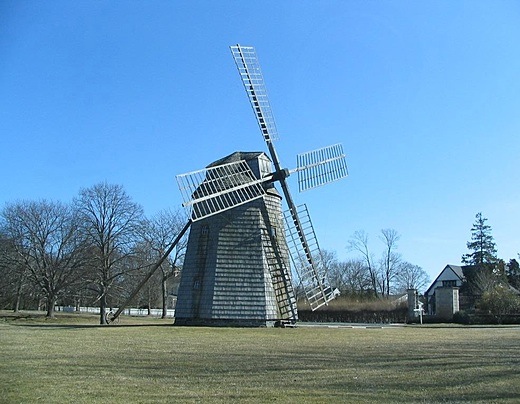SUBHEAD: The only feasible solution for a sustainable industrial society.
By Kurt Cobb on 05 July 2009 in Resource Insights
http://resourceinsights.blogspot.com/2009/07/brief-ecological-manifesto.html
[Author's Note: I'm not a European, but I play one on the Internet--at least for the next month. Comment: Visions, a website which "explores the personal views of thinkers, innovators and scientists about possible solutions to global warming, overpopulation and dwindling resources," asked me and other "European intellectuals and leaders" to respond to the following question for the month of July posting: "What can we do to ensure that generations to come have a sustainable future?"

image above: Dutch style 17th century windmill on Long Island, New York.
From http://outdoors.webshots.com/photo/1300245228057008850iamysx
We are in overshoot. Failure to recognize this fact and act on it will ultimately condemn humans worldwide to nature's cure for this condition: collapse. Overshoot is a well-defined ecological term; it means an organism is temporarily living beyond the long-term carrying capacity of its environment, that is, the ability of the environment to provide it with the needed food, energy and other resources for the long-term and to absorb the pollution it produces without destroying that carrying capacity.
Collapse is a more indefinite term, but it does not mean annihilation. Collapse in the case of human society implies a fairly rapid decline in population over perhaps many decades and the reorganization of society into smaller and far more decentralized units.
For those who say that this cannot happen, the onus is on them to show that the record of history (which is replete with such instances) and the findings of science no longer apply to humans. Our predicament is probably most aptly described by ecologist William Catton Jr. in his book entitled "Overshoot." The enabling substances for this overshoot have been fossil fuels. They have provided a one-time endowment of exceptionally concentrated energy which we have used to extract large yields from farms, forests, mines, fisheries and factories. Fossil fuels have enabled us to increase our population and our wealth exponentially in the last 150 years.
But once these finite fuels are burned, they are gone forever. The long-run alternative is solar, its derivatives of wind and water power, and possibly nuclear power. However, our problems run deeply across multiple natural systems--climate, fisheries, water, farm fields, and forests to name a few. Merely deploying alternative energy quickly enough to replace fossil fuels will not solve all our problems. In fact, increasing our use of energy could put even more pressure on the very natural systems upon which our lives depend.
How then are we to climb down off this ledge of overshoot and avoid crashing headlong into the valley of collapse? And, what should our destination be? The historical record has only a handful of examples of long-term sustainable societies, and they are based on agriculture and hunting and gathering. The Indian agricultural village and the Australian Aboriginal culture come to mind. But few people in industrialized nations desire a return to such forms of human society. When modern people speak of sustainability, they mean a sustainable industrial society. And so, we are in uncharted waters for there is no historical example of such a society to guide us.
We must rely instead on certain principles to tell us what to do. The bedrock principle that nature suggests is this: We cannot have infinite growth in the consumption of resources inside a finite system, the Earth. If we are in overshoot, as I suggest, then we are beyond the point of growing and must recede from our current consumptive habits.
How can we achieve this? I admit that my solution is one no sane politician would embrace: a steady-state economy, that is, an economy in which neither the throughput of material resources nor the associated pollution would grow. The quality of goods and services, however, could continue to increase so long as that increase in quality does not demand the use of additional resources. And, the satisfactions we obtain from nonmaterial sources such as friends and family, athletic and artistic pursuits, and religious practice could continue to deepen and grow indefinitely. Note, however, that while this is the description of a steady-state economy, it is not one of a steady-state society. Both the economic and cultural life of such a society would continue to evolve.
All of this seems hard enough to imagine, let alone implement. But we must go even further for we cannot achieve a sustainable, steady-state economy by merely ceasing to grow. Rather, because we are already in overshoot, we need to reduce drastically our use of resources, especially energy. This will doubtless require new technology to make us vastly more efficient. But it will also require that we rearrange our lives and change our habits so as to accomplish our goals by using far fewer resources than we do today. We will also need to bring down population gradually over time to a level consistent with long-term sustainability.
While what I'm suggesting may seem like an impossible political task, it is the only feasible solution for a sustainable industrial society. Either we summon the will to bring about a steady-state economy or nature will tragically and remorselessly implement one for us. These are our choices.
No comments :
Post a Comment